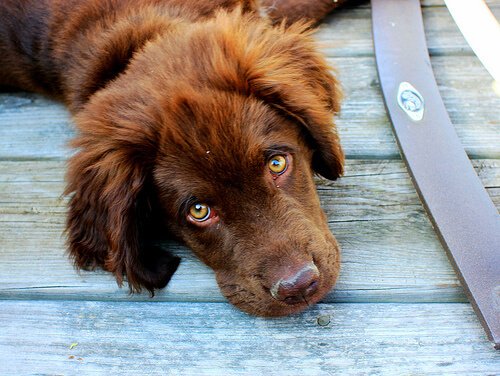Periodontal Disease in Dogs


Written and verified by the lawyer Francisco María García
Periodontal disease is one of the most common diseases in pets over 2 years old, and most small breeds are at risk. Bacterial plaque accumulates on the gums, and while it’s treatable in its early stages, if it continues without proper medical attention, it could have serious consequences.
What is periodontal disease in dogs like?
Although it’s more common than you may think, prevention is very important. If you don’t treat it in time, your dog may lose his teeth. It can also cause infections in the heart, lungs, or other organs.

What are the causes?
The main cause of periodontal disease in dogs is plaque buildup on the teeth. It forms when bacteria accumulates and interacts with saliva, forming a yellowish layer. This sticky layer adheres to the base of the teeth, which causes redness and inflammation in the gums (gingivitis). In addition, it often leads to bad breath (halitosis), a key indicator that something may be wrong.
What does periodontal disease do?
To start, although the tooth may look healthy, the bacterial plaque actually destroys the tissues that are connecting the tooth to the gum, loosening it. Pockets form between the tooth and the gum.
Then, the gum gets pushed back far enough to leave parts of the root uncovered. This part can be quite painful. If the plaque is not removed — which a simple cleaning can do — it can cause worse damage.
The consequences of periodontal disease
If you pay attention and catch the problem in its early stages (bad breath, inflammation), periodontal disease can be reversed. It’s also important to make sure it does not reappear.
However, more advanced periodontal disease, such as severe inflammation of the gums, can cause more complex damage. This is what may cause a loss of tissue, bone and the supporting structure around the teeth. It can also make the jaw weaken and even fracture.
This process, though controllable, cannot be reversed entirely. If the dog doesn’t receive proper treatment, he could get an infection in the lungs, liver and/or heart.
Recognize the symptoms
As we’ve said, bad breath is the first sign that something may be wrong, even if you think it’s normal for dogs to have halitosis. Inflammation of the gums is another sign to look for.
As the problem progresses, the swelling gets worse and you will see redness in the area. This may cause pain when eating and difficulty chewing.
As the bacterial plaque extends and adheres to the cavity between the gum and the tooth, the problem gets worse. You may notice teeth loosening and eventually falling out.
Diagnosis and treatment
Depending on the case and how advanced the periodontal disease is, the vet may order films taken to see the space below the gums. If your dog has early periodontal disease, the treatment will focus on plaque control and prevention. You will need to brush daily with a special toothpaste for animals.
If the disease is more advanced, you will need to take him for a general cleaning to remove tartar and plaque. In addition, the vet will likely prescribe antibiotic gels. In the most severe cases, ultrasound cleaning will be needed, along with surgery to remove the infected area.
How to prevent periodontal disease
- Feed your dog a healthy diet. Dry dog food is best; avoid very soft foods. Keep sweets and other unhealthy foods out of your dog’s diet as well.

- Get into an oral cleaning routine. This includes brushing with toothpaste or other products designed to prevent plaque and tartar buildup.
- Give your dog special tartar-removing treats. You dog will enjoy chewing them, but you’ll be protecting his oral health at the same time.
- If you suspect anything, always see a trusted vet right away for a check-up.
Periodontal disease is one of the most common diseases in pets over 2 years old, and most small breeds are at risk. Bacterial plaque accumulates on the gums, and while it’s treatable in its early stages, if it continues without proper medical attention, it could have serious consequences.
What is periodontal disease in dogs like?
Although it’s more common than you may think, prevention is very important. If you don’t treat it in time, your dog may lose his teeth. It can also cause infections in the heart, lungs, or other organs.

What are the causes?
The main cause of periodontal disease in dogs is plaque buildup on the teeth. It forms when bacteria accumulates and interacts with saliva, forming a yellowish layer. This sticky layer adheres to the base of the teeth, which causes redness and inflammation in the gums (gingivitis). In addition, it often leads to bad breath (halitosis), a key indicator that something may be wrong.
What does periodontal disease do?
To start, although the tooth may look healthy, the bacterial plaque actually destroys the tissues that are connecting the tooth to the gum, loosening it. Pockets form between the tooth and the gum.
Then, the gum gets pushed back far enough to leave parts of the root uncovered. This part can be quite painful. If the plaque is not removed — which a simple cleaning can do — it can cause worse damage.
The consequences of periodontal disease
If you pay attention and catch the problem in its early stages (bad breath, inflammation), periodontal disease can be reversed. It’s also important to make sure it does not reappear.
However, more advanced periodontal disease, such as severe inflammation of the gums, can cause more complex damage. This is what may cause a loss of tissue, bone and the supporting structure around the teeth. It can also make the jaw weaken and even fracture.
This process, though controllable, cannot be reversed entirely. If the dog doesn’t receive proper treatment, he could get an infection in the lungs, liver and/or heart.
Recognize the symptoms
As we’ve said, bad breath is the first sign that something may be wrong, even if you think it’s normal for dogs to have halitosis. Inflammation of the gums is another sign to look for.
As the problem progresses, the swelling gets worse and you will see redness in the area. This may cause pain when eating and difficulty chewing.
As the bacterial plaque extends and adheres to the cavity between the gum and the tooth, the problem gets worse. You may notice teeth loosening and eventually falling out.
Diagnosis and treatment
Depending on the case and how advanced the periodontal disease is, the vet may order films taken to see the space below the gums. If your dog has early periodontal disease, the treatment will focus on plaque control and prevention. You will need to brush daily with a special toothpaste for animals.
If the disease is more advanced, you will need to take him for a general cleaning to remove tartar and plaque. In addition, the vet will likely prescribe antibiotic gels. In the most severe cases, ultrasound cleaning will be needed, along with surgery to remove the infected area.
How to prevent periodontal disease
- Feed your dog a healthy diet. Dry dog food is best; avoid very soft foods. Keep sweets and other unhealthy foods out of your dog’s diet as well.

- Get into an oral cleaning routine. This includes brushing with toothpaste or other products designed to prevent plaque and tartar buildup.
- Give your dog special tartar-removing treats. You dog will enjoy chewing them, but you’ll be protecting his oral health at the same time.
- If you suspect anything, always see a trusted vet right away for a check-up.
This text is provided for informational purposes only and does not replace consultation with a professional. If in doubt, consult your specialist.








